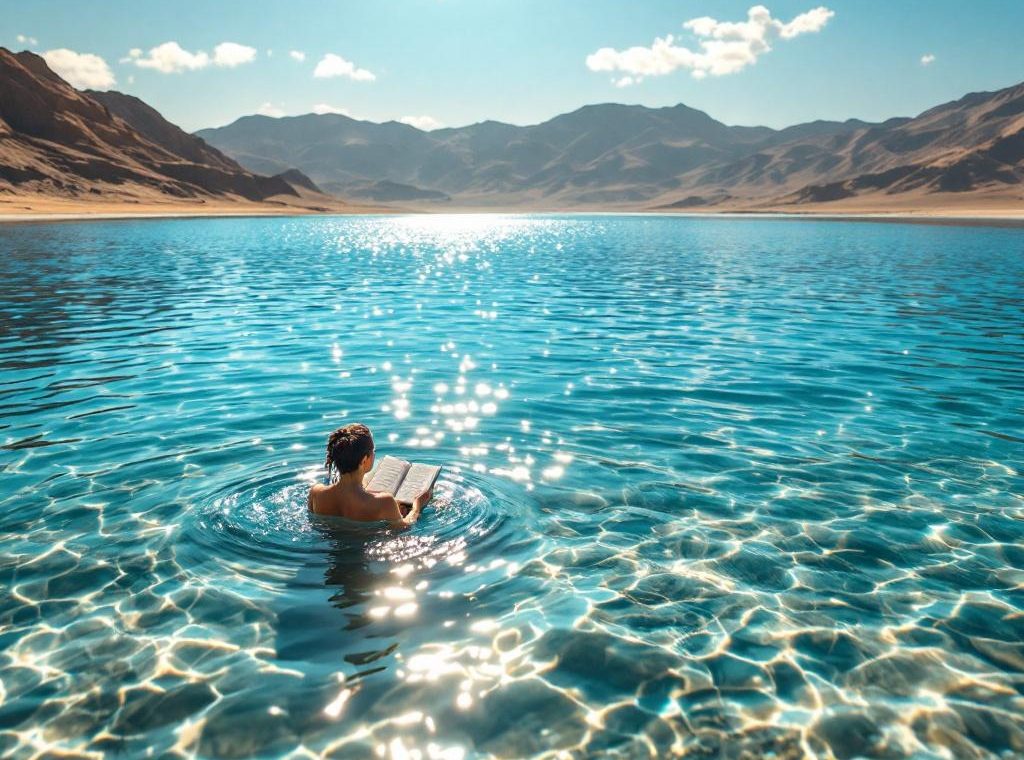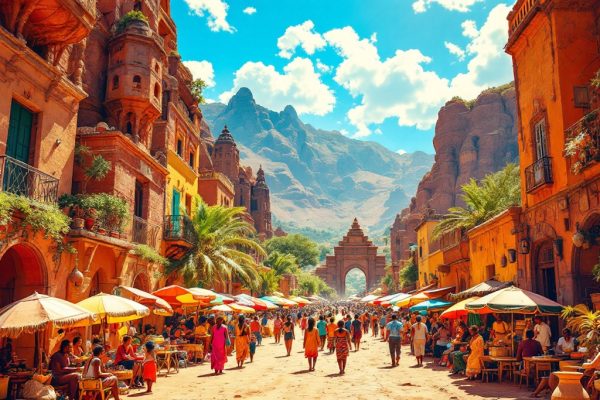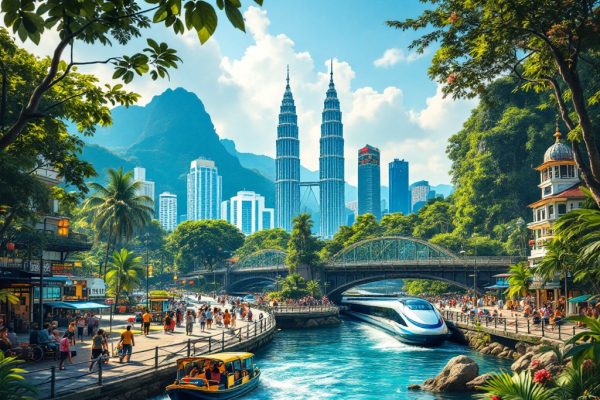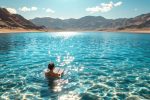Exploring the Dead Sea in Jordan and Israel
Imagine effortlessly floating in water so buoyant you can read a book! At 431 meters below sea level, the Dead Sea, Earth’s lowest point, offers this unique experience. Ten times saltier than the ocean, this hypersaline lake boasts mineral-rich mud known for its therapeutic properties. Discover the wonders of the Dead Sea, from rejuvenating mud baths to exploring nearby historical sites like Masada and Qumran. Dive in and explore this unique destination!
Important information
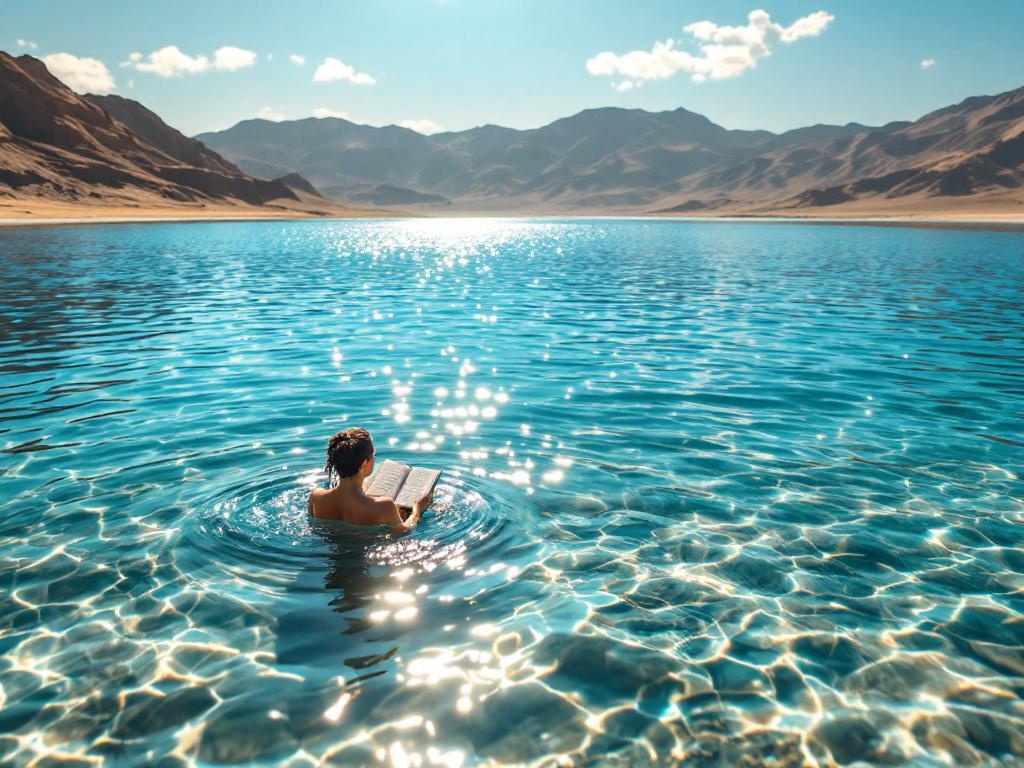
- Earth’s lowest point, the Dead Sea, is a hypersaline lake about ten times saltier than the ocean, allowing effortless floating.
- Mineral-rich mud with therapeutic properties is used for skin treatments and easing joint pain.
- The Dead Sea is bordered by Jordan and Israel, offering diverse historical sites and nature reserves.
- Water diversion and mineral extraction threaten the Dead Sea, causing it to shrink and form sinkholes.
- Visitors should avoid submerging their heads, protect their eyes, and shower after swimming in the salty water.
Introduction to the Dead Sea: A Unique Destination
Located 431 meters below sea level, the Dead Sea holds the title of Earth’s lowest point. It’s not a sea, but a hypersaline lake, providing a unique experience. The incredibly high salt concentration, about ten times that of the ocean, allows visitors to float effortlessly. Before you travel, make sure you have the necessary visa or permits. Check the latest entry requirements here with Passport Free Countries: https://passportfreecountries.org
Geographical Significance and Location
Located in the Jordan Rift Valley, the Dead Sea is bordered by Jordan to the east and Israel and the West Bank to the west.
At approximately 1,412 feet below sea level, it’s Earth’s lowest land point, contributing to its extreme salinity and ranking it among the world’s saltiest bodies of water.
Why the Dead Sea is a Bucket List Destination
The Dead Sea, renowned for its incredibly salty water, offers a unique experience: effortless floating. The mineral-rich mud is known for its therapeutic properties, attracting visitors seeking relaxation and potential health benefits. Beyond the sea itself, the surrounding region boasts nature reserves, hiking trails, and historical sites, promising a diverse and enriching travel experience.
Exploring the Dead Sea in Jordan and Israel
Discover the wonders of the Dead Sea from two captivating shores: Jordan to the east and Israel to the west. Experience the unique sensation of floating effortlessly and indulge in rejuvenating mud treatments, must-do activities on both sides. Explore fascinating nearby attractions unique to each country. Which shore will you choose?
Bordering Nations: Jordan and Israel
The Dead Sea, nestled between Jordan to the east and Israel to the west, offers a unique experience accessible from either country. However, if you plan to visit both sides, be aware of border crossing requirements and check schedules for both transport and crossings. Resorts on both coastlines offer stunning views and rejuvenating spa treatments. Don’t miss nearby historical sites like Masada and Qumran. With a little planning, your Dead Sea adventure awaits.
Access and Travel from Major Cities
The Dead Sea is easily reached from major cities like Jerusalem and Tel Aviv, with convenient public transportation options such as readily available buses.
Choosing Between Jordan and Israel for Your Visit
Looking for a peaceful getaway? Jordan’s tranquil resorts offer an ideal retreat. If you’re a history enthusiast, Israel, a land rich with ancient marvels such as Masada, combined with modern amenities, might be more your style. Both destinations provide unique experiences, including the unforgettable opportunity to float in the Dead Sea. To determine the best fit for you, consider your travel preferences. Jordan offers peace and tranquility, while Israel delivers a vibrant cultural experience.
Jordan
Seeking a peaceful and quiet retreat? Jordan offers serene resorts perfect for relaxation and tranquility.
Israel
History buff? Explore ancient wonders like Masada, seamlessly blended with modern comforts in Israel.
Both destinations offer the unique experience of floating in the Dead Sea.
Experiencing the Dead Sea: Floating and Healing
The Dead Sea’s extreme salinity, about ten times that of the ocean, makes floating effortless due to increased water density and buoyancy. Its mineral-rich mud, packed with magnesium, calcium, and potassium, is renowned for its therapeutic properties. These properties potentially improve skin health, reduce inflammation, and ease joint pain, making mud application a popular activity. Combining this unique mud with the salty water and abundant sunshine creates a therapeutic environment with numerous potential benefits. These benefits range from alleviating skin conditions like psoriasis and eczema to improving respiratory function and promoting overall relaxation.
The Floating Experience: Buoyancy and Salinity
The Dead Sea’s incredible buoyancy comes from its extremely high salt concentration of about 34%—almost ten times saltier than the ocean. This density, far greater than fresh or seawater, allows people to float effortlessly, making for a truly unique experience.
Mineral-Rich Mud and Its Benefits
Dead Sea mud, rich in minerals like magnesium, calcium, and potassium, has shown promise in easing skin conditions such as eczema and psoriasis. Its hydrating and rejuvenating qualities have also made it a popular spa treatment. However, it’s always wise to consult a doctor before using it for medicinal purposes.
Healing Properties and Therapeutic Effects
The Dead Sea’s mineral-rich mud and water offer incredible therapeutic benefits, particularly for skin conditions like psoriasis and eczema. This healing power comes from a high concentration of minerals, including magnesium, calcium, and potassium. Visitors frequently experience relief from joint pain and improved skin health. The unique environment also offers respiratory benefits, often providing relief to those with asthma and other breathing problems. The Dead Sea is truly a remarkable place of natural healing and offers the following benefits:
- skin health improvement,
- joint pain relief,
- respiratory benefits.
Spa and Wellness Experiences
Rejuvenate yourself with the Dead Sea’s therapeutic spa treatments. Many wellness centers and resorts along the shores offer mineral-rich mud baths and invigorating salt scrubs.
Natural Spa Treatments: Mud Baths and More
The Dead Sea, rich in minerals like magnesium, calcium, and potassium, offers renowned therapeutic mud baths. These mud baths are known to improve skin health, relieve joint pain, and promote relaxation. Further enhancing wellness, the Dead Sea also provides other natural spa treatments, such as sulfur pools and salt scrubs, each offering unique benefits.
Wellness Centers and Therapeutic Destinations
The Dead Sea area is famous for its wellness centers and offers various therapeutic treatments. These include revitalizing mud baths and mineral-rich soaks. Many resorts enhance the experience with spa services, using the region’s unique minerals and dry climate to promote relaxation and well-being. Beyond the spas, natural parks provide opportunities for invigorating mountain hikes. Nearby historical sites like Masada offer a glimpse into the past.
Attractions Near the Dead Sea
The Dead Sea region is home to several fascinating sites:
- Ein Gedi Nature Reserve: a haven for nature lovers, teeming with diverse flora and fauna.
- Masada National Park: a historical fortress offering a captivating glimpse into the past.
- Qumran: home to the Dead Sea Scrolls, ancient Jewish religious texts providing a unique insight into history.
Beyond these, the region boasts numerous archaeological treasures, many with significant biblical connections, enriching the experience for history enthusiasts and religious scholars.
Ein Gedi Nature Reserve
Near the Dead Sea, Ein Gedi Nature Reserve is a hiker’s paradise. Waterfalls tumble down rocky cliffs and deep canyons carve through the landscape. This desert oasis teems with wildlife, including ibex and hyrax. It offers a unique escape and a testament to nature’s resilience.
Masada National Park
Masada National Park holds immense historical and archaeological importance, offering breathtaking panoramic views of the Dead Sea and the surrounding desert landscape. Explore the ancient fortress built by Herod the Great and discover the remains of palaces, bathhouses, and other remarkable structures. The park poignantly recounts the story of Masada’s famous siege. Access the park via cable car or challenge yourself with an invigorating hike.
Qumran and Its Historical Importance
Qumran, nestled near the Dead Sea, is an archaeologically significant site renowned for the Dead Sea Scrolls. Discovered within the Qumran Caves, these scrolls contain ancient biblical texts and other documents, offering a glimpse into Jewish history and religious practices. Scholars believe the site was inhabited by the Essenes, a Jewish sect, from the 2nd century BCE to the 1st century CE. The scrolls provide invaluable insights into this era.
Archaeological Sites and Biblical References
The Qumran Caves, renowned for the Dead Sea Scrolls, offer a glimpse into ancient Jewish life.
Masada, a formidable fortress, stands as a testament to Jewish resistance against Roman rule.
Numerous other archaeological sites with biblical ties are scattered throughout the Dead Sea region, further illuminating its rich past and connecting visitors to history.
Cultural and Culinary Experiences
Experience Bedouin culture at a vibrant festival near the Dead Sea, featuring traditional music, dance, and captivating stories. Enjoy unique local cuisine, such as mansaf (a flavorful lamb dish) or makluba (a savory mix of rice, meat, and vegetables). The Dead Sea region offers diverse culinary delights reflecting its rich heritage.
Bedouin Culture and Local Festivals
Experience the rich tapestry of Bedouin culture, from vibrant music and dance to captivating stories and renowned hospitality. Local festivals offer a unique opportunity to engage with Bedouin communities and learn about their fascinating customs and traditions. Discover intricate crafts, savor delicious food, and join in the celebrations.
Sampling Local Cuisine Near the Dead Sea
From Jordan’s slow-cooked mansaf, a lamb dish served with rice and jameed (dried yogurt), to Israel’s fresh fish from the Sea of Galilee, the Middle East offers a diverse culinary experience. Regional staples like hummus, falafel, and shawarma are widely available, while dates and other local fruits provide a sweet finish. Many restaurants even boast stunning views of the Dead Sea, enhancing the dining experience.
Environmental Challenges and Conservation
The Dead Sea’s water level is falling drastically, dropping over a meter annually. A key factor is the diversion of water from its main tributary, the Jordan River, for agricultural and industrial use. Further exacerbating the decline is mineral extraction along the Dead Sea’s shores, shrinking the shoreline. While evaporation is a natural process, these human activities significantly accelerate the problem, leading to the formation of hazardous sinkholes. Fortunately, organizations are actively seeking solutions through water conservation efforts and sustainable tourism initiatives. One such initiative is a proposed canal to bring water from the Red Sea, replenishing the Dead Sea.
Water Diversion and Mineral Extraction Issues
The Dead Sea is steadily shrinking due to several factors. The main cause is water diversion from the Jordan River, its primary source. This vital resource is increasingly used for agriculture and human consumption, drastically reducing the inflow to the Dead Sea. Mineral extraction by companies further intensifies the issue, accelerating the decline in water levels. These combined activities have severe repercussions, including sinkhole formation and significant environmental damage.
Environmental Concerns and Future Prospects
The Dead Sea is rapidly shrinking, losing over a meter of water annually. This dramatic decline is primarily caused by water diversion from the Jordan River and mineral extraction, posing a serious threat to the surrounding environment and ecosystem. Receding water levels create sinkholes, damaging infrastructure and impacting tourism. However, collaborative conservation efforts, like the Red Sea-Dead Sea Canal project, offer a glimmer of hope. This ambitious project aims to replenish the sea’s dwindling water. Furthermore, sustainable tourism practices are crucial for minimizing environmental impact and ensuring the long-term survival of this unique natural wonder.
Conservation Efforts and Sustainable Tourism
The Dead Sea faces a critical threat. Water diversion and mineral extraction damage this extraordinary ecosystem, causing its shoreline to recede and its environment to transform. However, hope remains. Ongoing conservation efforts aim to mitigate these harmful impacts. Promoting sustainable tourism balances economic growth with environmental safeguards by educating visitors about responsible travel and implementing careful resource management. Smart development strategies further contribute to these crucial endeavors, ultimately striving to preserve the Dead Sea for future generations.
Practical Tips for Visitors
Best Time to Visit
The Dead Sea enjoys sunshine year-round, but spring (March-May) and autumn (September-November) offer the most comfortable temperatures. These seasons are ideal for swimming and other outdoor activities. Summers (June-August) can be extremely hot. Winters (December-February) are generally mild, though rain is possible.
Important Precautions
Due to the high salt content, take these precautions at the Dead Sea: avoid submerging your head and protect your eyes. Shower after swimming to rinse off the salt, and wear water shoes to protect your feet. Stay hydrated by drinking plenty of fresh water, and limit your time in the water, especially if you have sensitive skin. Avoid shaving before swimming to prevent irritation.
Best Time to Visit the Dead Sea
Spring (March-May) and autumn (September-November) offer the most comfortable temperatures for sightseeing and exploration. Summer (June-August) can be extremely hot, with temperatures often exceeding 40°C (104°F). Winter (December-February) offers mild days and cool nights, ideal for outdoor activities and relaxing spa treatments.
Safety Tips and Precautions
Before your visit to the Dead Sea, avoid shaving or waxing 24 hours prior to prevent skin irritation. Do not enter the water with any open wounds or cuts. Shower immediately after leaving the sea to rinse off the salt and minerals. Protect your eyes by avoiding splashes and consider wearing goggles. Never swallow the water, as it can cause nausea and vomiting. Floating on your back is recommended to keep the water out of your face and mouth. If you experience any discomfort, exit the water immediately and seek assistance. Water shoes are recommended to protect your feet from salt crystals and rocks. Remember to stay hydrated by drinking plenty of fresh water.
Avoid shaving or waxing 24 hours before your visit to prevent skin irritation.
Do not enter the water with open wounds or cuts.
Shower immediately after leaving the sea to rinse the salt and minerals.
Protect your eyes by avoiding splashes and consider wearing goggles.
Never swallow the water, as it can cause nausea and vomiting.
Float on your back to keep the water out of your face and mouth.
If you experience discomfort, exit the water immediately and seek assistance.
Wear water shoes to protect your feet from salt crystals and rocks.
Stay hydrated by drinking plenty of fresh water.

